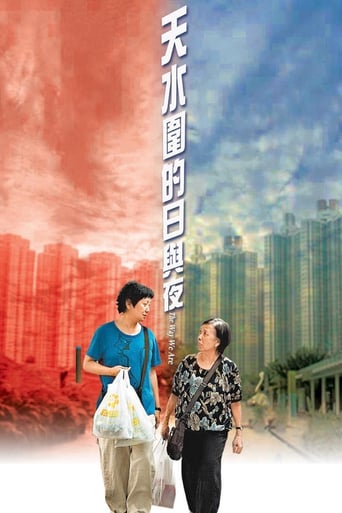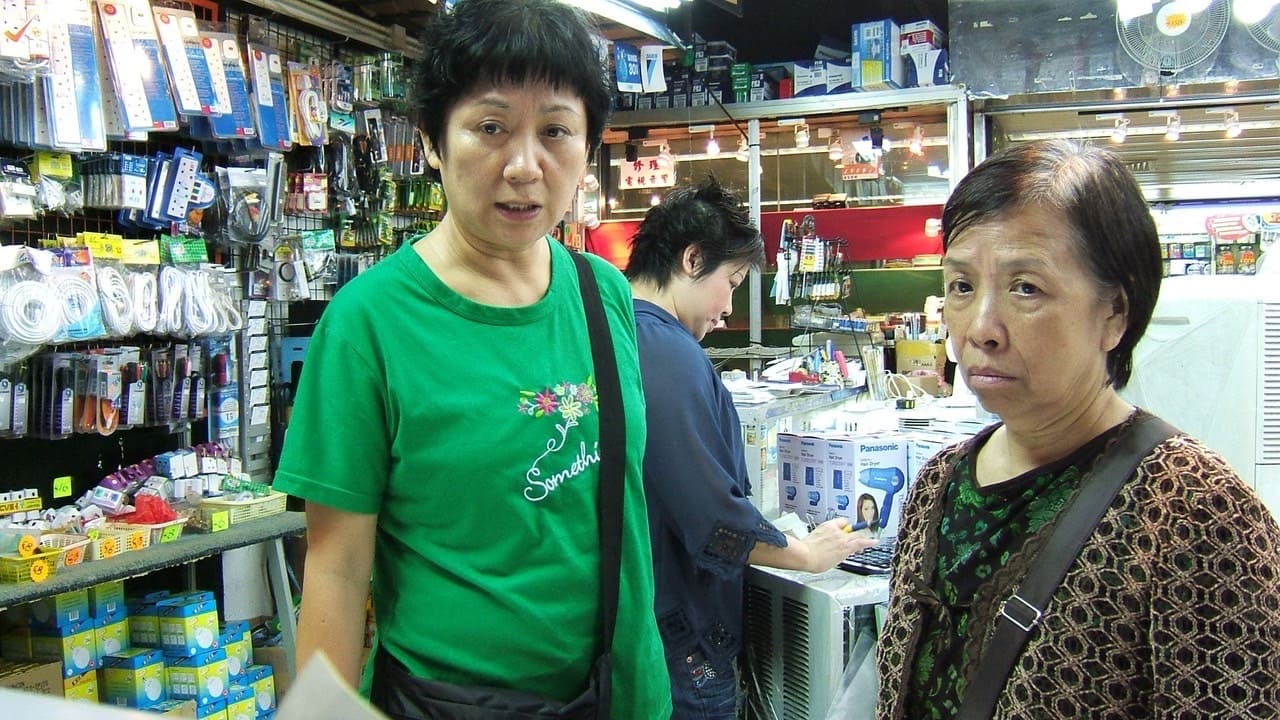seanmok
Ann Hui, an internationally acclaimed Hong Kong director, is perhaps the closer soulmate to Mike Leigh in world cinema today. "The Way We Are" tells the story of a hardworking, good-hearted widow (Mrs. Cheung) who is living with his teenage son (Ka-on) in a housing estate in Tinshuiwai, a suburb regularly featured in the news for all the wrong reasons - family suicide packs, problem teens abusing drugs and massive unemployment.At the start we see the two circling around in a tiny apartment with little communication, each trapped in their own worlds. Cheung works in the fruit counter in a supermarket, while Ka-on spends his summer vacation idling at home waiting for the results of his university entrance exam. Soon we are introduced to Cheung's extended family - then we learn that she spent her young adult life working hard in factories to support her two younger brothers, paid for their education and they've both since moved upward. But before she has her chance, her husband died and left her behind in a poor lower-class suburb.Cheung soon befriends another widow, Granny, who's just moved in the same building. Granny has her grim tale - she was forced to live on her own after her only daughter died and her son-in-law remarried. Her grandson is now what remains of her "family", but he's sadly out of reach. She begins to imprison herself in her "single elderly" flat until Cheung slowly reaches out to her.Then the somber tone of the story takes on an optimistic note. Cheung, ever so nurturing, takes Granny in and they soon bond to form their own support network. We also learn that Ka-on, despite the ear-ring and dyed hair, has inherited the strong, resilient and optimistic personality of his mother, ready and able to take up responsibilities to keep his little family together.The relationship between Cheung and her brothers is also not as remote as it is suggested earlier in the film. While they're no longer as close and the brothers still put their own families before all else, they're here to help Cheung and Ka-on and willing to pay her back by promising to send Ka-on to study overseas if he should fail his exam.At the end Granny's barriers have broken down, implanting herself in her new "family" and treating Ka-on like the grandson that she's no longer able to see ("Even when I die and become a spirit, I will continue to pray for his well being..") and there's still hope for happiness for both women.Ann Hui's direction is bare but her fingerprints are everywhere. There are no comedic distraction to pull us out of the morbid tone of her characters' stories (like she did in "Summer Snow", dealing with the grimmer topics of aging and Alzheimer's disease). We instantly know what is in Cheung's mind (wonderfully plays by veteran TV actress Paw Hee-ching, deservedly named Best Actress in the HK Film Award) with every little gestures - that she's appreciative of having a good son with a hint of a smile, a loving expression that knows how life is still good and a light assuring grab of Granny's hand to pull her up from the dark pit of remorse.While Hui is unique and successful in her own right, I can't help but thinking back to similar characters in Mike Leigh's films - Cheung has the same stubbornness of Poppy in "Happy-Go-Lucky", her relationship with the brothers is akin to the implicit blood-is-thicker-than-water bond Cynthia has with Maurice in "Secrets and Lies" and the overall "plotless" structure of storytelling is very much like "Life is Sweet".And its lesson and massage maybe the same - that although life is hard for Cheung, Granny and Ka-on, it's still sweet and hope is everywhere as long as we still have the will to look for it.
Winnie Bree
The movie is one of the most recommended movies especially after it won four awards at the Hongkong Film Award. As many viewers have said, it is a very Hongkongese movie. Although I am not a Hongkongnese,I can relate to the everyday stories in the movie. It may seem boring to most Westerners,but I have to say a good movie can also present a real world in which real people are living a real life. While watching the movie, I smiled a lot and cried a lot.Then I felt hopes in the end.Life is not all about getting what you want.It is also about giving what you can give to the people you love or care.Watching a movie and learning something from it matters more.
delticpro
Definitely 1 of of 10 for this movie. I'd rather watch an Indian all dancing and singing movie than to waste my time on this one. I completely agree with some comments made here, nothing ever happened. Is his a diary or blog of some ordinary citizens on Hong Kong?The movie just didn't make any point or statement, it did not make the spark for me to saying this is worth watching.Definitely a one off bad movie coming out of Hong Kong, I will never miss a good old king fu movie or a good comedy from the likes of Stephen chow, what a good job it was never translated to English for the British here in UK, or the whole nation will die of boredom.
Huang Yaoshi
What do movies tell us about what kind of people we are? Imagine the following: you are an alien from outer space, who is about to get into the space ship to visit planet Earth. Before you leave, you are instructed to learn as much as possible about the people and their culture who live on this planet. Your homework: to watch all the movies produced in the last year.Think about what kind of image you would get from looking at what kind of movies we produce and watch as people. There is an abundance of Hollywood movies. You might think we are all American. Or that we imagine to be super heroes. So much special effects. How would our lives look like if they were like Hollywood movies? But of course, our lives are most of the time nothing like Hollywood movies.Showing a movie that just portrays how we are would be boring. Would it not? Ann Hui doesn't think so. She provocatively titled her latest movie The Way We Are. Ann Hui is perhaps the most gifted story teller in Hong Kong, at least when it comes to film making. The same way Ozu chronicled the lives of Japanese society, Hou Hsiao-hsien and Edward Yang documented the day-and-nights of Taiwanese people growing up, Ann Hui is the cultural biographer of Hong Kong.When it comes to Hong Kong movies, most people might think of kung-fu stars, like Bruce Lee or Jackie Chan or Jet Li, or perhaps triad movies, made famous by John Woo, and more recently Johnnie To. Some might even think of Wong Kar Wai. But the films of Ann Hui are those who directly go to the core of what Hong Kong is about - but this core is as most of our lives perhaps unspectacular, mundane, and banal.Ann Hui nevertheless manages to weave an incredibly rich story detailing the mundane lives of people in a part of Hong Kong that is often sensationalized: Tin Shui Wai. It's a part of town that is considered desolate, characterized by social problems, unemployment, with high buildings (some might think of them as Hong Kong's version of "the projects").What is worth telling here is a story from a part of society that you otherwise would never see or hear. But that they don't exist in our popular imagination doesn't mean they exist, and it doesn't mean that we shouldn't know about. Most movies have spoiled the way we "consume" them: often slick, highly visualized, with something to grab our attention every three seconds (if not less). This movie by Ann Hui needs to be slowly taken in, with patience.That is to say, our starting assumption should be that there are really no boring people. That every person has a story to tell, and that when they try to tell you their story, the least you could do is listen to them, with the patience and respect every human being deserves. Because, that's the way we are. Ann Hui, thank you for reminding us of this important lesson.


 AD
AD



